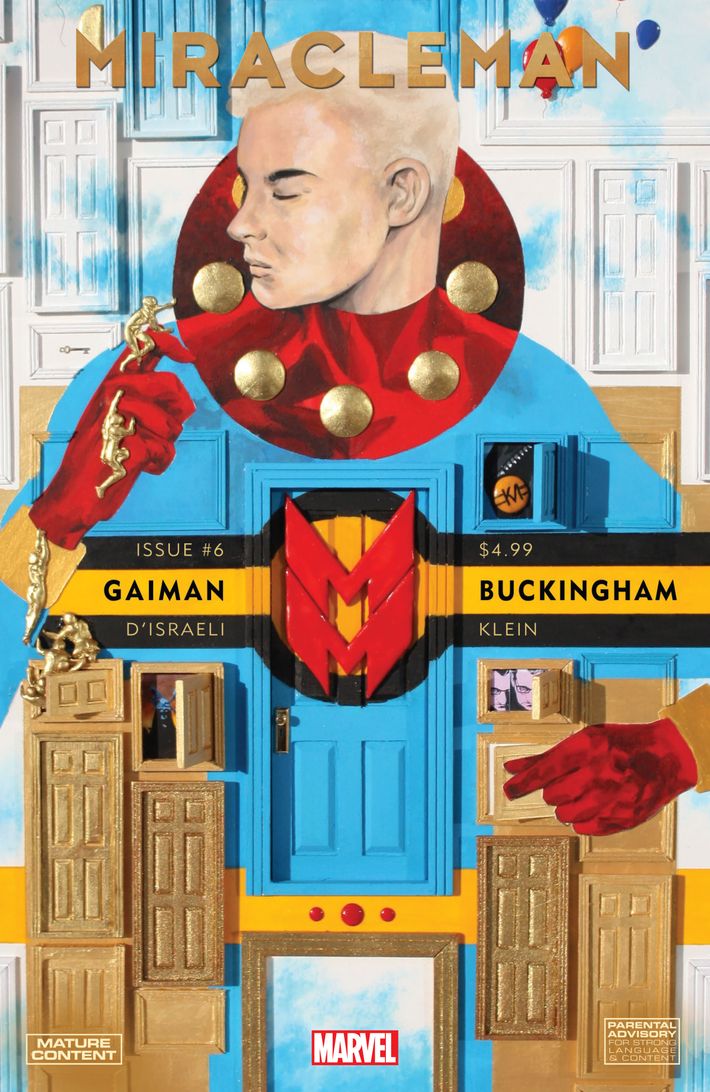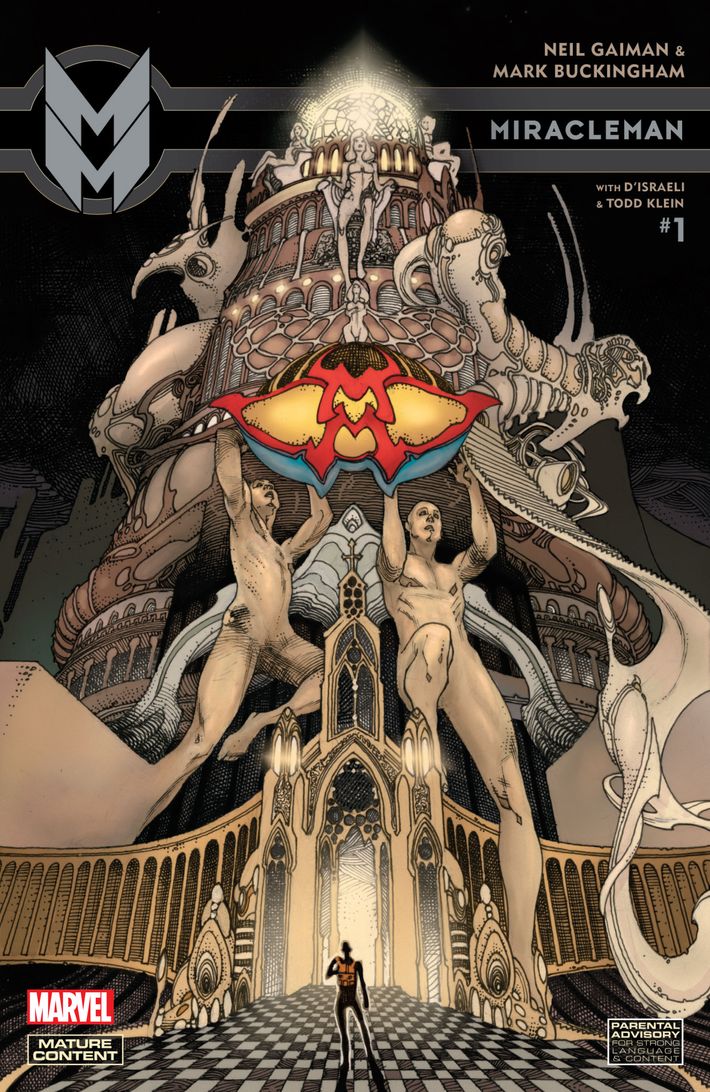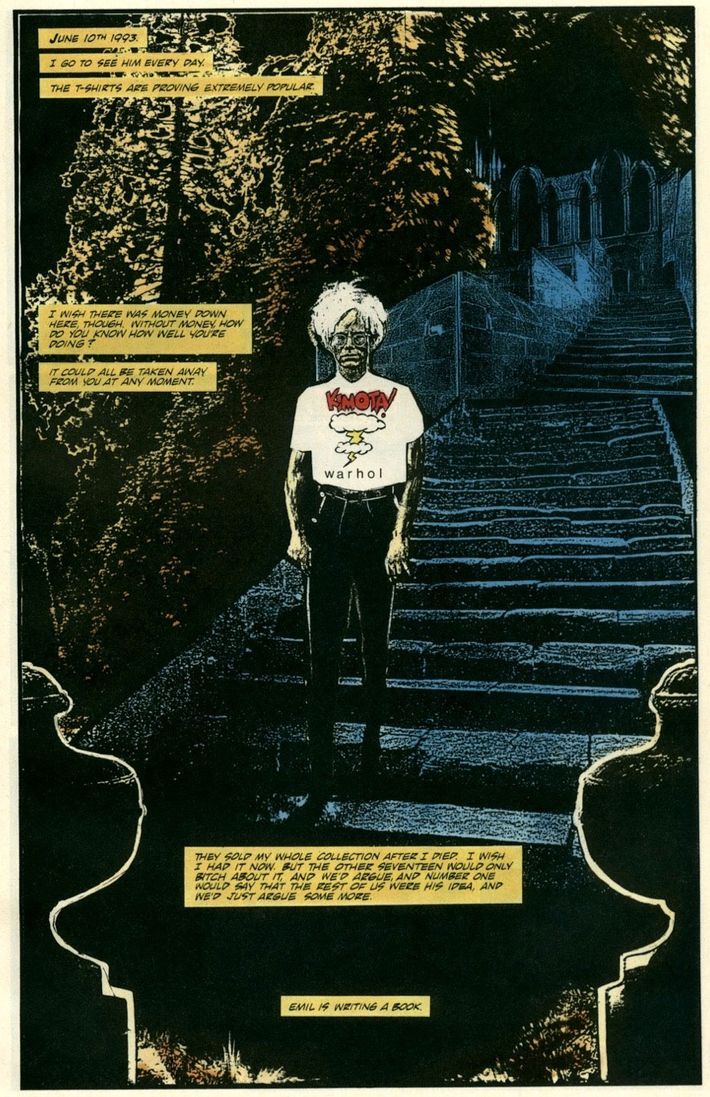
A long time ago (the 1980s), in a faraway land (the United Kingdom), a little-known lad began a great journey — and now, after decades of delay, that journey is about to come to an end. Before Neil Gaiman became one of the best-known and most-respected fantasy authors of his generation, before he exploded onto the comics scene with his hit series Sandman, he was a budding journalist and part-time comic-book writer. Then, out of the blue, comics god Alan Moore (himself still a relative unknown) asked Gaiman to write Marvelman.
The series was already a strange and revolutionary experiment, and Gaiman pushed its boundaries even farther. Marvelman was a U.K. sensation in the 1950s, but the title character had disappeared from stands until Moore resurrected him in 1982 and gave him a shocking revisionist origin story: This clean-cut, Superman-esque hero had actually been created as a government weapon, and after discovering his secret history and defeating a superpowered rival, he installed himself as a benevolent god, building a worldwide utopia. These new Marvelman stories, published in the U.K. comics anthology Warrior, were an underground sensation.
But the series’ publishing history was anything but marvelous. After a series of legal battles, Moore left and appointed Gaiman as his successor. To avoid a copyright tussle with Marvel Comics, the series was renamed Miracleman and published sporadically by American outlet Eclipse Comics. When Eclipse went defunct in 1993, more legal troubles mounted, meaning Gaiman’s Miracleman run was not only unfinished but also impossible to reprint. It was one of comics’ great lost masterpieces.
Now, after herculean legal efforts from Gaiman and a landmark 2009 deal, Marvel has been republishing Miracleman, and Gaiman has signed on to write the remainder of his long-delayed story. We caught up with Gaiman for a chat about Miracleman’s tortured and fascinating backstory, a glimpse at his arc’s final stages, and a tale about the time Lou Reed accused him of plagiarism. Plus, there’s an exclusive first look at all-new cover artwork for the upcoming run. It’s a miracle.
Did you read the pre–Alan Moore Marvelman when you were a kid?
No, mostly because I was the wrong age. Alan Moore read Marvelman because it was around when it was originally out. He’s seven or eight years older than I am. By the time I was a child of comic-buying age, Marvelman had vanished and disappeared off into wherever it is that comics that are no longer published go. It’s really weird looking back on it, how terrible of a comics hipster — not that we had a word for it — I was when I was 16, 17, 18. Here’s Warrior coming out and I’m going, “It can’t be good, it’s English! Everybody knows that cool comics come from America.” So I didn’t buy the first few Warriors more or less on principle. I was working as a journalist, and one of my editors happened to be a big comics fan and gave me an enormous pile of Warriors to read, with Alan [Moore]’s stories in them, and I was completely hooked.
It’s really hard now to explain to people why this was so important, why this mattered. One reason is that after Alan did Marvelman, it changed the way people did superheroes. Anybody who’s written a superhero owes such an enormous debt to what Alan did back then, but you go back now and it’s almost hard to see how this changed everything because we’ve seen its children, its grandchildren, its great-grandchildren. This is where it all started. This is the place where the idea of, Okay, what happens if we put these four-color characters in a world that we can recognize as a real world — how does that work? Who are they? What happens? And it had the everything you know is wrong hook, which has since become the ultimate cliché.

It’s interesting that you say the story was putting superheroes in a world that we recognize as our own because that was the premise of Moore’s most famous work, Watchmen. But while Watchmen is about heroes who are just normal people in costumes, Marvelman turns out to be godlike. It becomes a utopian story, very removed from our world.
Right, and what’s fun is it becomes not only utopian but monstrous. You have one superhero battle, and it’s a terrible thing that leaves Earth with a psychic wound that’s almost impossible to overcome. In old comics, like old sitcoms, it didn’t matter what happened — at the beginning of the next episode you’re back in the status quo. Alan was the first person to go, “You can’t actually do that.” If Superman existed, he would change the world. Miracleman, with almost infinite power, creates a utopia as best he can and sets himself up as a god. It’s fascinating because it’s the only place where Alan tapped into the wind of power as opposed to being against it. Normally Alan’s work is sort of a critique of power. You look at Watchmen, you look at V for Vendetta, they’re all about entities misusing power. But in Miracleman, he goes, “Okay, could you use power for good? If you had infinite power, how would you use it?”
How did you become Moore’s successor on the series?
I was a 26-year-old journalist and I’d written a few comic scripts that Alan had seen. One day the phone rang, and he said, [Voice drops low] “Hey, Neil, it’s Alan. Listen, I’m going to wrap up Miracleman at the end of book three, and by the time I’m finished, he’s going to create the perfect world in which there will be no more criminality, war, injustice, poverty, or any of the other things that you normally drive a story with. Would you like to take over?” And I said sure, figuring that people don’t normally phone you up and give you something amazing and perfect, especially when you’re untried and untested, but he did.
I started thinking about utopia and the idea of writing a story set in a golden age. The idea of, We’re in utopia, let’s see what that’s actually like for the people in the story. You can take the camera off Miracleman. He’s a god, so what becomes interesting are stories like, here are five people going up a pyramid to see him and ask him for things. How does a utopia work in terms of love? In terms of family? I was a young writer going, I don’t know if I could write a superhero comic, but I could write interesting utopian science-fiction. Dystopias are the fun ones that people love. Everybody loves a good dystopia. Utopias are so much harder. Then there’s the idea of, Okay, let’s go ahead 300 years, let’s follow the story and let’s see what happens in a slow fall from grace that takes us from the golden age to the silver age to the dark age.

Speaking of a fall from grace: when did you realize that getting to the end of your run was going to be a near-impossible task?
It was weird working for Eclipse. They weren’t very good at paying us. [Miracleman artist Mark Buckingham] and I wound up doing this thing where we wouldn’t even start writing the next issue until we were paid for the last one. The delays between issues were getting longer and longer because the checks were getting slower and slower. Then I got a call one day from somebody at Eclipse saying, “Everything’s closing down here. Anything could happen. We have your art, and we’re going to send you the Miracleman stuff back.” So Miracleman No. 25 — which they’d had for about a year at that point and hadn’t come out because I don’t think they had the money to publish it — was sent back to us. That was a wonderful thing, because if that person hadn’t sent that back, I think the art would’ve vanished or been quietly sold. But we got that art back and then it turned into a glorious nightmare of bankruptcy.
There were various groups trying to buy it out of bankruptcy, and then there was [comics creator and publisher] Todd McFarlane, and then there was Todd lying and pulling back on everything that he’d agreed and breaking his word, and then a legal case. It was only once we were in the middle of the legal case that we realized that Todd and Eclipse probably hadn’t owned anything. It took many many years and Marvel coming in. And this may sound crazy, but I never thought the story would be unfinished.
That does, indeed, sound crazy.
I think the last issue to have been published was in 1993. Now we’re 22 years on, but I always felt like one day it would happen! The weirdest bit was [recently] pulling out a bunch of pages from the next issue that I’d written and looking at them and going, This is great! I’d completely forgotten this entire sequence of scenes! I wonder what happens next? And now I’m going, Can Mark Buckingham and I at least fake this well enough so that nobody reading it is going to go, “This word balloon is a 1993 word balloon, and the next word balloon on the top of the next page is a 2015 word balloon”?

One of your best-loved Miracleman stories is “Notes From Underground,” a single-issue tale starring Andy Warhol. How did that story come to be?
There was a line of Alan’s [from his issues], a throwaway line about bringing back Warhol from the dead and Warhol immediately bringing back a whole bunch more Warhols. I just thought, What a beautiful idea! And it’s the only comic of mine that I know Lou Reed read.
Really?
The only time Lou and I met in the flesh, he pointed out I’d used a line of his in the story: “My father worked in construction,” from Songs for Drella [Reed and John Cale’s concept album about Warhol]. He said, “Why are you ripping me off?” And I said, “Because I learned more about Warhol’s voice in Songs for Drella than I did the entire Victor Bockris Warhol biography!” [Laughs.] And Lou looked really happy at that.
What can we expect from the new stories?
It’s one of those things where the weirdest part of this for me is knowing that I’ve had the last issue in my head since the beginning. I could write the last page of it now. What’s so strange is the idea that, in the next few years, it will be done and I will be one step further toward the grave.




